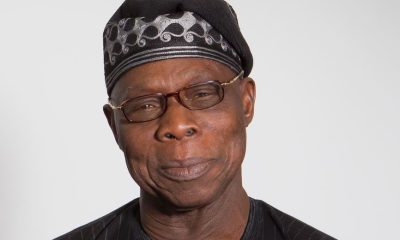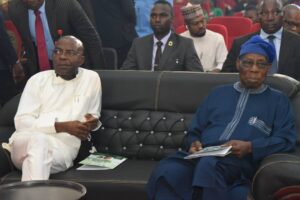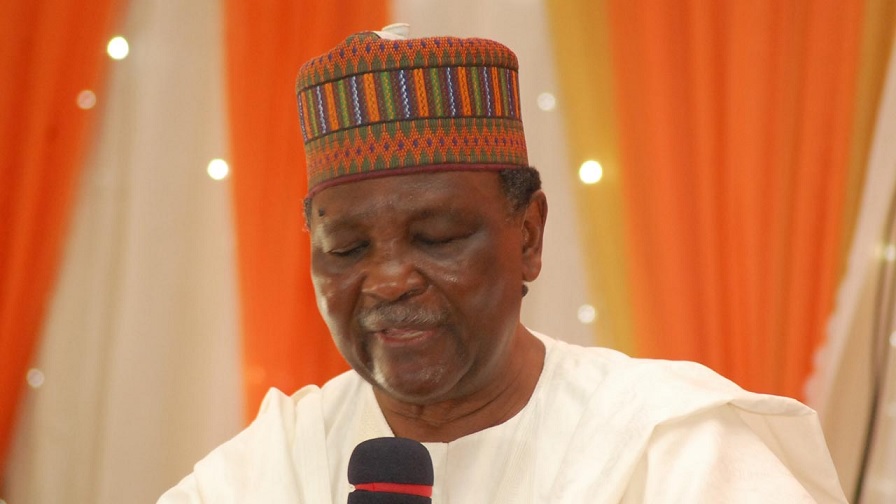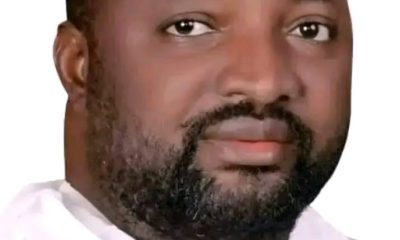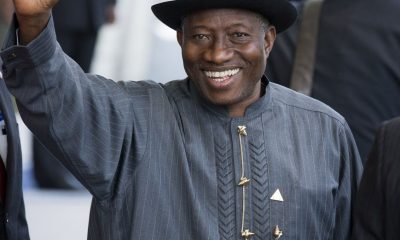POLITICS
Why did Southeast Vote for Obasanjo Against Ojukwu in 2003

By Fredrick Nwabufo
Those plunking for secession and advancing hate for the north may not know that the region was once a convenient political ally of the south-east. The political establishment of the 1960’s was governed by the north and the south-east in expedient nuptials — before the January 1966 coup which opened Pandora’s Box.
The north and the south-east have had a crossed destiny.The politics of the Igbo has not always been suffused with emotions and native prejudices.
A good case is the pragmatic entente Nnamdi Azikiwe’s NCNC forged with Ahmadu Bello’s NPC in the 60s – despite the two parties’ diagonal differences. While Bello’s NPC was ultra-conservative, Azikiwe’s NCNC had a liberal character.Also, in 1979 the south-east worked with the north to see the emergence of Alex Ekwueme as Nigeria’s first vice-president under a presidential system of government — and with Shehu Shagari as president — less than 10 years after the Nigeria-Biafra civil war. In fact, while Ekwueme was a member of the National Peoples Party (NPP), Shagari was a member of the National Party of Nigeria (NPN). But this did not stop the entente cordiale.
Although the NPP/NPN alliance later became fractious in 1981, the emergence of an Igbo citizen as vice-president a few years after the war blurred the blot of the Igbo being a conquered people. It was under this arrangement that Odumegwu Ojukwu was allowed to return to Nigeria from exile in Ivory Coast in June 1982. And a year after his return (in 1983) he ran for senatorial office – but lost.
The south-east was heuristic in these instances, and played real politick. But what happened afterwards?
In the 2003 presidential election in which Ojukwu, the famed Igbo leader, vied, the south-east voted tremendously for his rival – Olusegun Obasanjo of the Peoples Democratic Party (PDP). In fact, Ojukwu’s ‘’Igbo party’’, the All Progressives Grand Alliance (APGA) could not even win governorship elections in the south-east except in Anambra — the late politician’s native home.
In Anambra, Obasanjo had 466,866 votes which represent 54 percent of the entire count while Ojukwu had 279,378 – 34 percent of the total tally. In Abia, Obasanjo had 386,748 votes (51.7 percent) while Ojukwu had 260,899 votes (34.9 percent). In Ebonyi, Obasanjo had 752,823 votes (94.5 percent) but Ojukwu polled only 20,525 votes (02.6 percent) within the same range as Muhammadu Buhari who had 16,308 votes in the state.
In Enugu, Obasanjo had 897,721 votes (79.7 percent) while Ojukwu had 177,050 votes (15.7 percent). And in Imo, Obasanjo polled 656,861 votes (64.6 percent), but Ojukwu had 281,114 votes (27.7 percent). The late Igbo leader’s second attempt in 2007 was also unsuccessful.
Obasanjo trounced Ojukwu on his own turf. Why? The election was not so much about Ojukwu, but about the centring of the south-east. The Igbo elite consorted with the PDP which at the time had a national appeal, and they were able to pivot the south-east in the nucleus of national politics.
But the south-east’s liaison with the PDP over the years has not yielded commensurate dividends in terms of economic and infrastructural developments for the region. The beneficiaries of the PDP years were the elite who had sizeable representations in government.
With the deracination of the PDP from central power, the south-east slumped into opposition – a role it has shown a lack of artistry and tact to handle. There is also the south-south quandary. With the south-south emerging as a redoubtable power bloc, the south-east lost its bearing and place as the ‘’beautiful bride’’.
The south-east regaining its place means it must look beyond a solitary party. It must put itself in the thick of things. And to sit at the table, it should discard isolationist politics and work with Nigerians across regions and parties – as it did in the past. It must forge new alliances – a political and social concordat.
Ojukwu’s Victory in Defeat
Although Ojukwu lost the election, his participation in the exercise was of consequence. His participation showed manifest belief in Nigeria. A non-believer in a united Nigeria will not seek to be the country’s president. So, the involvement of Ojukwu, being a former separatist leader, in the election exemplified a reformed mindset committed to building a Nigeria where justice and equity reigns.
In a 2017 broadcast, President Buhari revealed his conversation with the late Ojukwu on Nigeria.
He said: “In 2003 after I joined partisan politics, the late Chief Emeka Ojukwu came and stayed as my guest in my hometown Daura. Over two days we discussed in great depth till late into the night and analysed the problems of Nigeria. We both came to the conclusion that the country must remain one and united.”
Whatever change we seek is in the ballot and not in the barrel of a gun. Ojukwu’s victory is the personal example he showed by participating in elections and chaperoning a political party — APGA — long after the war. He buried the hatchet and looked to a new future in a united Nigeria. The party stands to date. We should emulate him.
POLITICS
Bye-Election: Court Orders INEC to Upload Labour Party Candidates, Recognise Abure led Executives as authentic

Ahead of the August 16, 2025 bye-election and the Federal Capital Territory council election, a High Court has ordered the Independent National Electoral Commission, INEC to accord exclusive recognition to Barrister Julius Abure and Alhaji Umar Farouk Ibrahim as the authentic leadership of the Labour Party.
The court presided over by Hon.
Justice Mustapha A. Ramat of the Nasarawa state division had on July 23, 2025 in a SUIT NO. NSD/LF.84/2024 in an interlocutory order directed INEC to also grant Access Code to Julius Abure and Alhaji Umar Farouk Ibrahim to upload the names and particulars of their nominated candidates for the bye elections and the FCT Area Council elections as scheduled by the INEC.INEC has refused to publish the names of the nominated candidates by the Labour Party in a bye-election scheduled to hold on Saturday as well as the FCT council elections scheduled for early 2026.
Extract of the court Order of the Court reads; 1. AN ORDER OF INTERLOCUTORY INJUNCTION OF THIS HONOURABLE COURT directing the Defendant (Independent National Electoral Commission) to accord exclusive recognition to only the officers of Labour Party including the 2nd and 3rd Plaintiffs Julius (Abure and Alhaji Umar Farouk Ibrahim) as the National Chairman and National Secretary, who emerged from the convention held at Nnewi, Anambra State on the 27” day of March, 2024 as the authentic officers of the 1st Plaintiff (Labour Party) pending the hearing and determination of the substantive suit.
2.AN ORDER of Interim Injunction restraining the Defendant from dealing in any way-or manner or otherwise according any recognition whatsoever to any person (s) claiming to be officers of the 1st Plaintiff, except the officers who emerged from the convention held at Nnewi, Anambra State on the 27th day of March, 2024 pending the hearing and determination of the substantive suit.
- AN INTERLOCUTORY ORDER directing the Defendant to grant access Code to the Plaintiffs to upload the names and particulars of their nominated candidates for the bye elections of FCT Area Council Elections scheduled by the Defendant.
- AN ORDER of this Honourable Court granting accelerated hearing of this suit.
- AND for such further order or other orders as the Honourable Court may deem fit to make in the circumstances.
AND AFTER HEARING the submissions of Idris Yakubu, MCI Arb. UK (Esq.) Counsel for Plaintiffs and none appearance of the Defendant after dully served with the Motion on Notice (M1/2025) dated 17th day of July, 2025.
IT 1S HEREBY ORDERED that:
The application/reliefs sought as herein contained are hereby granted as prayed.
Case is accordingly adjournment to 22nd September, 2025 for hearing of the main case.
Reacting to this development, the National Secretary of the Labour Party, Umar Farouk, applauded the intervention of the court describing it as a welcome development and an order which will right the many wrongs meted to the authentic leadership of the party.
According to Umar Farouk, “We received this intervention with a heart full of gratitude. We are however hoping that INEC as a law abiding institution, will do the needful by formally publishing the names of our nominees for the bye election and the FCT council elections without further delay”.
He however reiterated that they are not happy that their candidates and party have not been given equal opportunity and time to campaign like other political parties. This he added is clearly a systemic route orchestrated by INEC to perpetually prevent Labour Party and its candidates from favourably participating in elections.
“Recall that in Ondo state, INEC granted Labour Party’s governorship candidate access code barely 24 hour to the election. This has become a norm and we will not take such treatment any longer.
“Finally, we urge our candidates not to be undaunted or dismayed by these glaring limitations. Labour Party is a household name. We expect nothing but victory in all these contested offices. We also call on members of the party in the affected states to once more show their indomitable and ‘never die spirit’ to return our candidates.”
POLITICS
Mass Defection Hits PDP in Dankwambo’s Polling Unit

In a major political move in Gombe State, the Chairman of Gombe Local Government and state ALGON Chairman, Hon. Sani Ahmad Haruna (Wakilin Arewan Gombe), has welcomed a large group of defectors from the Peoples Democratic Party (PDP) to the All Progressives Congress (APC).
The defectors are from the polling unit of former Gombe State Governor, Dr.
Ibrahim Hassan Dankwambo on Tuesday.They were led by the Senior Special Assistant on GOSTEC, D.
J. Mai Taya, who presented them to the APC leadership during a reception ceremony.Speaking at the event, Barr. Sani Haruna praised the new members for what he described as a bold choice.
He assured them of equal opportunities and inclusion in party affairs, saying the APC was committed to good governance, unity, and sustainable development.
Representing the State APC Chairman, Nite K. Amangal, the Gombe LGA APC Chairman, Alhaji Abubakar Danladi, commended the unity among party members and promised continued support for both old and new members.
Also addressing the gathering, the Special Adviser on Security to the Governor, Hon. Abubakar Aminu Musa, called the defection “a major step towards consolidating political unity and enhancing grassroots participation in governance.”
Some defectors said they were impressed by Governor Muhammadu Inuwa Yahaya’s leadership style and the APC’s development achievements at both state and national levels. They cited these as the main reasons for switching parties.
The event drew party stakeholders, ward councillors, and a large crowd of supporters, ending with calls for collective efforts to strengthen APC’s presence ahead of future elections.
End
POLITICS
2027: APGA Founder, Chekwas Okorie Rallies Igbo Political Leaders
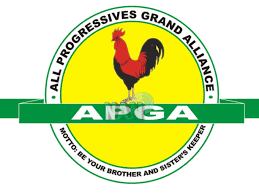
The pioneer National Chairman and founder of the All Progressives Grand Alliance (APGA), Chekwas Okorie, has called a meeting of Igbo political leaders and elite to discuss the mobilisation of Ndigbo towards 2027 elections and beyond.
In a letter he wrote inviting some Igbo leaders, Okorie said, “After a number of consultations, it became compelling that a select number of our leaders across political party lines and other critical stakeholders be invited to deliberate on what ought to be the agenda of Ndigbo in Nigerian politics irrespective of political party affiliation.
”The elder statesman stated: “God has blessed Ndigbo with a huge population and enviable geographical spread, which have remained largely untapped over the years.
We have no excuse to lack relevance and well deserved respect in Nigeria.”Okorie suggested that the meeting was not for 2027 alone.
“We owe ourselves and our younger generations the responsibility to provide the required guidance and chart a deliberate action-plan to reverse our present unacceptable situation in a sustainable manner. It is for this and other related matters, that this meeting has become compelling and crucial.”
The meeting, which is under the auspices of Igbo Agenda Dialogue, though political, is non-partisan.
“I wish to emphasize that this meeting is non-partisan even as the subject matter is political,” Dr Okorie insisted.
Majority of the invitees have enthusiastically accepted the invitation to the meeting which will be held in Abuja before the end of August, 2025.
End

